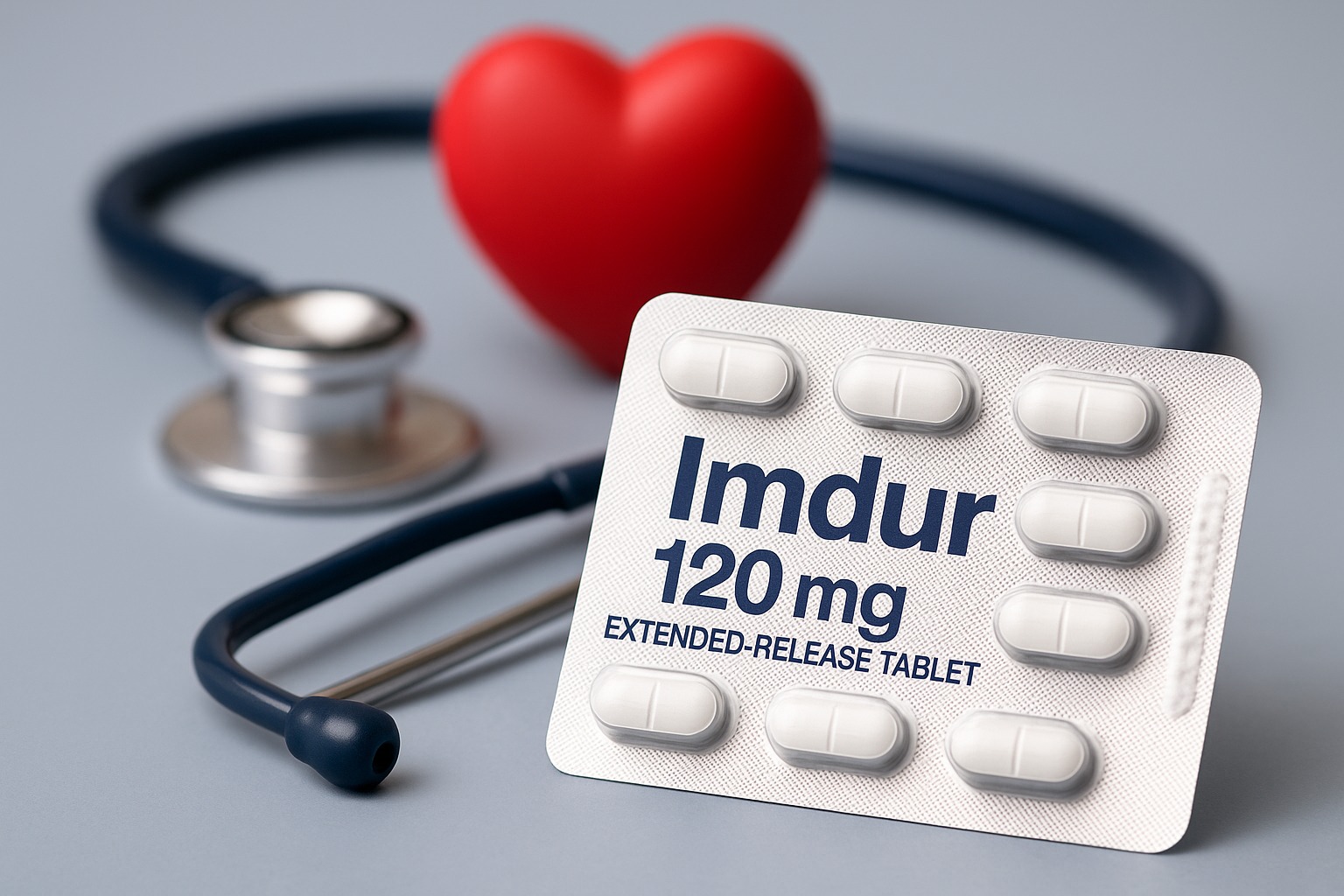Imdur (isosorbide mononitrate) is a prescription medication used to prevent chest pain (angina) in people with certain heart conditions. It belongs to a class of medicines called nitrates, which work by relaxing and widening blood vessels, making it easier for blood and oxygen to flow to the heart. Doctors often prescribe Imdur when lifestyle changes and other treatments aren’t enough to control angina symptoms.
In this easy-to-read guide, you’ll learn what Imdur is, how it works, when doctors prescribe it, how to take it safely, possible side effects, precautions, and answers to some of the most common questions people search online.
Quick disclaimer: This article is for education only and not a substitute for professional medical advice. Always follow your doctor’s instructions.
What is Imdur?
Imdur (isosorbide mononitrate) is a long-acting nitrate that helps reduce the frequency of angina (chest pain). Unlike nitroglycerin, which works quickly for immediate relief, Imdur is taken daily to prevent chest pain episodes from happening.
Imdur is available in extended-release tablets, typically in the following strengths:
- Imdur 30 mg extended-release tablet
- Imdur 60 mg extended-release tablet
- Imdur 120 mg extended-release tablet
Warnings
Follow all directions on your prescription label and package. Tell each of your healthcare providers about all your medical conditions, allergies, and all medicines you use.
- Do not take Imdur if you are also using medications for erectile dysfunction (such as sildenafil/Viagra, tadalafil/Cialis, or vardenafil/Levitra), as combining them can cause a dangerous drop in blood pressure.
- Imdur should not be used to treat sudden chest pain (an angina attack). Use a fast-acting nitrate (such as nitroglycerin) for acute relief.
- Avoid alcohol while taking Imdur, as it may increase side effects like dizziness and low blood pressure.
Before taking this medicine
Tell your doctor if you have ever had:
- Low blood pressure or fainting spells
- Heart failure or heart valve problems
- Anemia (low red blood cell count)
- Glaucoma
Imdur may not be safe during pregnancy or while breastfeeding. Speak with your healthcare provider before use.
How do I take Imdur?
Take Imdur exactly as prescribed by your doctor.
- Swallow the tablet whole with a glass of water. Do not crush, chew, or break the extended-release form.
- Take the medicine at the same time each day, usually in the morning.
- Your doctor may start you on a lower dose and gradually increase it to reduce side effects like headache.
- Do not suddenly stop taking Imdur, as this can increase your risk of angina.
What happens if I miss a dose?
Take the medicine as soon as you remember, but skip the missed dose if it’s almost time for your next one. Do not take two doses at the same time.
What happens if I overdose?
Seek emergency medical attention or call the Poison Help line at 1-800-222-1222. Overdose symptoms may include severe dizziness, fainting, fast heartbeat, or shortness of breath.
What should I avoid while taking Imdur?
- Avoid alcohol, which can increase dizziness or fainting.
- Do not use erectile dysfunction medications while taking Imdur.
- Avoid standing up too quickly from a sitting or lying position to prevent lightheadedness.
What are the side effects of Imdur?
Get emergency medical help if you have signs of an allergic reaction, such as hives, difficulty breathing, or swelling of your face, lips, tongue, or throat.
Call your doctor right away if you experience:
- Severe dizziness or fainting
- Fast or pounding heartbeat
- Chest pain that worsens or does not improve
- Shortness of breath or swelling in your legs
Common side effects may include:
- Headache (very common, especially when starting Imdur)
- Flushing (warmth, redness, or tingling)
- Dizziness or lightheadedness
- Nausea
Headaches usually become less frequent as your body adjusts to the medication.
What other drugs will affect Imdur?
Tell your doctor about all medicines you use, especially:
- Erectile dysfunction drugs (Viagra, Cialis, Levitra) – dangerous interaction
- Blood pressure medications
- Other nitrates (isosorbide dinitrate, nitroglycerin)
Storage
- Store at room temperature away from heat and moisture.
- Keep out of reach of children.
Popular FAQ
Is Imdur used for heart failure?
Imdur is primarily prescribed for angina, but in some cases, doctors may use it in combination therapy for heart failure.
How long does it take for Imdur to start working?
It usually starts working within 30–60 minutes, but its main purpose is long-term prevention of angina attacks.
Can Imdur raise or lower blood pressure?
Imdur lowers blood pressure by relaxing blood vessels.
Is there a generic version of Imdur?
Yes, the generic name is isosorbide mononitrate, which is widely available and often less expensive.
Final Thoughts
Imdur (isosorbide mononitrate) is an effective medication for preventing angina by improving blood and oxygen flow to the heart. While it is not used for sudden chest pain, it plays a crucial role in long-term heart health management. Like all medicines, it must be taken exactly as prescribed to ensure safety and effectiveness.
Always follow your doctor’s guidance, take your medication consistently, and report any unusual side effects. With the right use, Imdur can help reduce chest pain episodes and improve your overall quality of life.


Magnificent beat ! I would like to apprentice while you amend your site, how could i subscribe for a blog website? The account aided me a acceptable deal. I had been tiny bit acquainted of this your broadcast offered bright clear idea